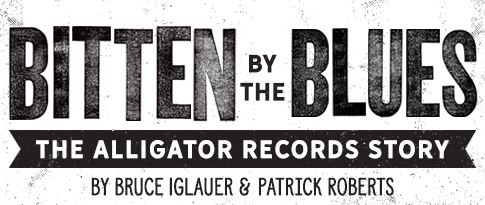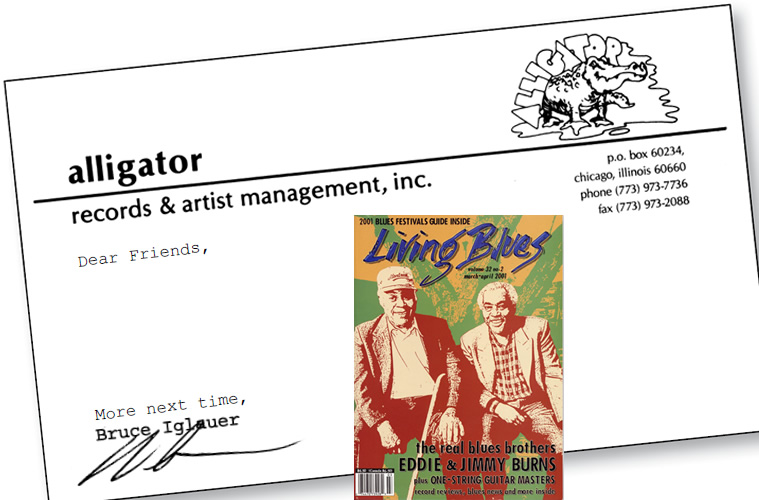Dear Friends,
As we move into Alligator’s 30th year of recording the blues, I have very little time to reflect on the past. As has been true since 1971, I’m so busy making records and trying to market them that I have very little space in my life for looking backwards. I’m very proud of what Alligator has come to mean to blues fans, and the role we’ve played as a “bridge” to bring the blues that we all love to new fans. I’m also proud of the artists we’ve brought forward from relative obscurity–from Hound Dog Taylor and Son Seals in the ‘70s to Lil’ Ed and the Blues Imperials, Little Charlie and the Nightcats, The Kinsey Report, Kenny Neal and Tinsley Ellis in the ‘80s to Saffire, Michael Hill’s Blues Mob, Corey Harris and Shemekia Copeland in the ‘90s. I hope to be able to make the same claims for the next 30 years of Alligator’s history!
Speaking of Saffire, I just returned from Virginia where we cut 19 songs for their seventh Alligator release, which will be out in late spring. Those Uppity Women are playing and singing better than ever. They are delightful people to work with, fun and funny, but very serious about their music.
Meanwhile, Marcia Ball is hard at work on her Alligator debut, produced by Doyle Bramhall, Sr. I’ve only heard the rough mixes, but this sounds to me like Marcia’s strongest album yet, and one that mines her deep well of Gulf Coast and Texas soul ballads, as well as plenty of joyful, jumping R&B. We’re expecting a late April release for Marcia, just in time for the New Orleans Jazz & Heritage Festival.
I was telling you last time about making “High Compression,” the first of the two albums that James Cotton cut for Alligator in the mid-‘80s. I hadn’t really known James that well during the 14 years I had been living in Chicago; he spent a lot of time on the road. But as we began planning the project, I found him to be a great guy. He was full of stories about Muddy, Sonny Boy and the other elder statesmen who had inspired and hired him. He almost never made himself the center of the stories; these men were his heroes, and he was honored to have played with them. But he was also honest. Some of his stories about Muddy were not about the dignified elder statesman of the blues, but about the real hoochie coochie man, a born lover who wanted to make sure that there were plenty of women who could testify! He also told me about the jealous Muddy, the hard-drinking Muddy and even the sometimes violent Muddy. But James told these stories with reverence, even with love, like an ancient Greek might speak about the gods. Just like me, he had never stopped being a fan.
James also had an encyclopedic knowledge of old records, and could quote the lyrics to hundreds of songs. I remember talking with him about “Soon Forgotten” (an obscure St. Louis Jimmy Oden tune covered by Muddy). He quoted me the lyrics, which mention the year 1941. I corrected him, saying that it was 1951. And then he corrected me, pointing out that it was 1951 in the Muddy version, but ’41 in the original!
Recording James was easy –he had one of the tightest, funkiest bands in town and he rehearsed them to razor sharpness. The songs on “High Compression” that were cut with his road band were strictly his doing; he and the band arranged them and brought them to me in the studio ready to go. Other than my asking for a few alternate solos, I had very little to do as a producer; I just wasn’t needed. On the other hand, when James asked me to assemble a more traditional band for half a dozen songs, I was happy to help! Of course Pinetop Perkins was an easy choice on piano, and I suggested my old pal Aron Burton (an original Icebreaker) to play bass. For drums, I chose Robert Covington, one of the few younger players who really understood old school drumming. His years with Sunnyland Slim had taught him well. And on guitar, I picked Magic Slim, then and now one of the purest Chicago bluesmen around. It was a memorable session.
I’ll tell you why next time.
Bruce Iglauer

